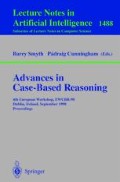Abstract
Given the processing speed of the best chess computer is 200 million times faster in terms of positions evaluated per second than a human chess expert, a grandmaster, the question is not how can a computer beat a chess grandmaster but rather how do chess grandmasters beat computers? In computing terms, the human expert's strength lies in the ability to significantly prune the search tree and to correctly evaluate the resulting positions. This paper addresses the first of these strengths and proposes an example-based reasoning mechanism to select candidate moves from a given chess position. The mechanism automatically generates an example-base from a database of grandmaster chess games using Principal Component Analysis to characterise the positions in the games database. Given a new position, its characterisation is compared to those in the example-base and a ranked list of n “similar” moves is returned. This forms the basis of an effective forward pruning mechanism in a two player adversarial game.
Preview
Unable to display preview. Download preview PDF.
References
Knuth, D.E., Moore, R.W.: An analysis of alpha-beta pruning. Artificial Intelligence 6 (1975) 293–326
Marsland, T.A.: Relative efficiency of alpha-beta implementations. In Procs. 8th Int. Joint Conf. on Art. Intell, Karlsruhe, Germany, (1983) 763–766
Berliner, H.J.: The B* tree search algorithm: A best first proof procedure. Artificial Intelligence 12 (1979) 23–40
Stockman, G.C.: A minimax algorithm better than alpha-beta? Artificial Intelligence 12 (1979) 179–196
McAllester, D.: Conspiracy numbers for min-max search. Artificial Intelligence 35 (1988) 287–310
Plaat, A., Schaeffer, J., de Bruin, A., Pijls, W.: A Minimax Algorithm Better than SSS*. Artificial Intelligence 87 (1996) 255–293
de Groot, A.D.: Thought and choice in chess. The Hague: Mouton (1965)
Chase, W.G., Simon, H.A.: Perception in chess. Cognitive Psychology 4 (1973) 55–81
Simon, H.A., Gilmartin, K.: A simulation memory for chess positions. Cognitive Psychology 5 (1973) 29–46
George, M., Schaeffer, J.: Chunking for Experience. In Advances in Computer Chess VI, D.F. Beal (ed.), (1991) 133–146
Flinter, S., Keane, M.T.: On the Automatic Generation of Case Libraries by Chunking Chess Games. In Procs. 1st Int. Conf. on Case Based Reasoning, M. Veloso and A. Aamodt (eds.), Springer Verlag, (1995) 421–430
Bratko, I., Tancig, P., Tancig, S.: Detection of Positional Patterns in Chess. Advances in Computer Chess IV, D.F. Beal (ed.), (1986) 113–126
Campbell, M.S., Berliner, H.J.: Using Chunking to Play Chess Pawn Endgames. Artificial Intelligence 23 (1984) 97–120
Gruber, H., Ziegler, A.: Components of expertise: Looking for SEEK in sorting. Review of Psychology 2 (1995) 13–21
Pearson, K.: On lines and planes of closest fit to systems of points in space. Phil. Mag. 2 (1901) 559–572
Hottelling, H.: Analysis of a complex of statistical variables into principal components. J. Educational Psychology 24 (1933) 417–441, 498–520
Mardia, K.V., Kent, J.T., Bibby, J.M.: Multivariate Analysis. Academic Press. (1979)
Author information
Authors and Affiliations
Editor information
Rights and permissions
Copyright information
© 1998 Springer-Verlag Berlin Heidelberg
About this paper
Cite this paper
Sinclair, D. (1998). Using example-based reasoning for selective move generation in two player adversarial games. In: Smyth, B., Cunningham, P. (eds) Advances in Case-Based Reasoning. EWCBR 1998. Lecture Notes in Computer Science, vol 1488. Springer, Berlin, Heidelberg. https://doi.org/10.1007/BFb0056327
Download citation
DOI: https://doi.org/10.1007/BFb0056327
Published:
Publisher Name: Springer, Berlin, Heidelberg
Print ISBN: 978-3-540-64990-8
Online ISBN: 978-3-540-49797-4
eBook Packages: Springer Book Archive

